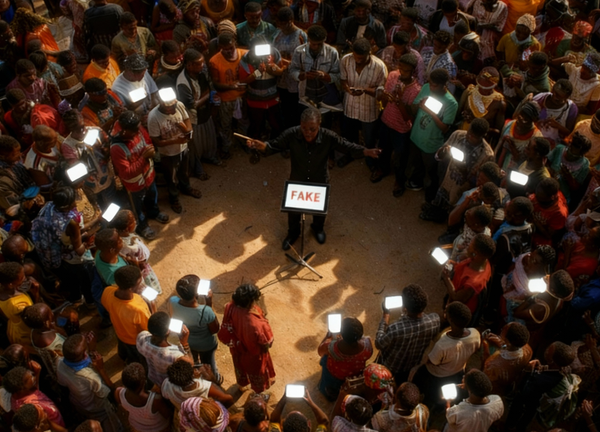La désinformation en ligne (particulièrement les « fake news ») coûte à l’économie mondiale près de 80 milliards de dollars par an. Les marchés boursiers mondiaux subissent chaque année un impact négatif de la désinformation à hauteur d’environ 40 milliards de dollars dont 0,05 % de perte directes suite aux « fake news ». Aux États-Unis, le secteur de l’épargne-retraite subit chaque année environ 19 milliards de dollars de désinformation financière délibérée. La désinformation touche tous les pays dans tous les secteurs et institutions du monde entier : l’Afrique ne fait pas figure d’exception.
L’image de l’Afrique, dans les médias, est généralement représentée par un enfant sous-alimenté et sans instruction, vivant dans des bidonvilles dans un milieu traditionnel. Ailleurs qu’en Afrique, cette image est continuellement relayée par les parents qui disent à leurs enfants : « Allez, termine ton repas car il y a des enfants qui meurent de faim en Afrique. Ils n’ont pas accès à de la nourriture comme celle-ci ! ».
Même s’il y a en Afrique une pauvreté et une grande diversité culturelle (au même titre que sur les autres continents), cela ne correspond pas au quotidien de beaucoup d'africains. Les stéréotypes diffusés par une représentation médiatique négative de l’Afrique coûte au continent Africain des milliards de dollars. Les investisseurs et les touristes évitent de venir en Afrique car ils pensent que les Africains vivent dans la jungle au milieu d’animaux et qu’ils sont dépourvus de commodités et d’accès à l’électricité. Les médias ont généralement une fausse image du secteur touristique africain et ces mêmes médias véhiculent toujours cette idée fausse que l’Afrique manque de potentiels touristiques.
Les surprises du “sud global”
En juillet 2024, l’actrice américaine Tiffany Haddish a visité le Zimbabwé, et à sa grande surprise, elle a découvert un supermarché. Elle a posté une vidéo sur son compte TikTok, tout en en partageant son expérience : « Bonjour à tous ! Je suis ici, à Harare, au Zimbabwe, et regardez ce supermarché! Ils ont un supermarché, c’est incroyable ! ». Puis elle se rend au rayon fruits et légumes : « Regardez, il y a des fraises bio. J’adore ça et ils vendent de la canne à sucre c'est super bon! Ils ont leurs dates sur les étals. Regardez cette épicerie, elle est immense, c’est absolument énorme en Afrique! ».
Puis elle répète "Croyez-moi" 4 fois, comme si elle cherhait à convaincre son audience qu'elle se trouve vraiment en Afrique. Elle poursuis en s'exclamant « Afrique, Zimbabwe, j'aime tellement briser tes mythes ».
Passant dans le rayon boucherie du supermarché, Tiffany confirme à ses abonnés que : « Ça ne sent pas mauvais ! ».
Continuant ses découvertes, l’actrice s’émerveille dans les différents allées de l’établissement s’arrêtant sur des « magazines people », où elle se fait la remarque de n’être « probablement dans aucun d’entre eux ».
La vidéo est devenue virale sur TikTok et a enregistré plus de 943 000 vues avec 57 600 likes, 10 700 commentaires et 7055 partages. Beaucoup d'utilisateurs se sont sentis blessés qu’elle puisse être surprise de trouver un supermarché au Zimbabwé.
Certains accusent Haddish de propager le stéréotype où les Africains vivraient de manière primitives sans bénéficier d'accès aux comodités. Sur Tik Tok, une personne sous le pseudonyme de Shar💕 commente : « vous pensiez que nous mangions de l’herbe ? ». L'actrice lui répond: « Non. Mais les médias m’ont fait croire que tous vos aliments sont achetés dans des marchés exterieurs où les chèvres et les vaches attendent d’être abattues, entourées par des odeurs diverses et des mouches ».
Un autre utilisateur, CHINEMEREM, attaque frontalement l’artiste: « Comédienne perdue et ratée, actrice croyant être pertinente. Votre ignorance et votre stupidité seront votre fin ».
Nombre de personnes ont trouvé la vidéo offensante mais certains comme Daniel Freeman, en tire du positif: « Ce que les gens ne comprennent pas, c’est qu’elle montre aux Américains que nous ne vivons pas dans des arbres comme ils le pensent 💯💯J’adore cette vidéo ».
Après avoir reçu de nombreuses réactions hostiles de la part de ses abonnés, d'autres utilisateurs et des médias, l'acrtice s'est formellement exprimée page X (anciennement Twitter), pour répondre aux inquiétudes suscitées par cette affaire.
Elle accuse la désinformation propagée par les médias d'être à l'origine de sa réaction au supermarché et affirme qu'elle essayait de changer le discours en montrant « Le fait que l'on nous ai menti là dessus est ce qui est mauvais. Rien de tout cela est vrai. Je montrais juste à ma communauté qu'elle avait tort ».

S'accordant à dire que le problème réside dans une vision unilatérale de l'Afrique dans les médias, @moxie31 a écrit sur X : « Pour être objectif, les médias américains disent que les gens vivent dans des huttes et dans des villages dépourvus de modernité sans aucun accès à de l'eau potable. C'est pourquoi les Noirs américains sont choqués lorsqu'ils visitent l’Afrique... c'est de la faute de l'Amérique ! ».
Le compte X, de Cissey Matavire, confirme les propos de Tiffany Haddish en tweetant : « Elle ne pense pas cela. Elle prouve clairement à ses fans que le Zimbabwé et les autres pays africains ne sont pas ce qu'ils imaginent, on leur a lavé le cerveau.».
Sur un autre compte X, @thejessicatapia, affirme que : « Les médias décrivent l'Afrique toujours dans le même sens ; beaucoup de gens ne prennent pas le temps de vérifier les informations. Je ne suis donc pas surprise qu'elle ait pensé cela ».
Dans un tweet follow-up tweet, Tiffany répond : « Écoutez, les amis ! Il n'y a rien de MIEUX que de voir la réalité de ses propres yeux ! Mon cœur déborde de joie et je me demande pourquoi nous n'avons pas fait ça plus tôt. Cet endroit est incroyable ! »
Les chutes du lac Victoria: sans chute?
La désinformation et la mauvaise représentation médiatique découragent le tourisme et les investisseurs de venir en Afrique.
Fin 2019, des sources inconnues ont partagé des images de la plus grande chute d'eau du monde, les chutes Victoria, une attraction touristique majeure située entre le Zimbabwe et la Zambie, en affirmant que la chute d'eau s'était asséchée. Cette image incomplète capture principalement le côté zambien de la chute d'eau, qui connaît la pression d'eau la plus faible pendant la saison sèche - des mois d'octobre à décembre et janvier, ce qui rend les formations rocheuses bien visibles, en particulier le long du côté zambien. Cette saison sèche, permet aux visiteurs de vivre toute une série d'expériences, notamment des vues claires et dégagées des chutes, la baignade dans la piscine du Diable, située sur le rebord des chutes, qui offre aux visiteurs une vue imprenable sur les chutes, et des aventures palpitantes de rafting en eaux vives, qui sont toutes impossibles pendant la saison où la pression de l'eau est élevée. L'image du côté zambien asséché de ce monument mondialement connu a fait croire à de nombreux touristes et visiteurs que les chutes d'eau n'existaient plus, ce qui a entraîné des annulations massives de réservations auprès de nombreux voyagistes.

Représentation graphique des niveaux d'eau saisonniers des chutes Victoria © Africa Albida Tourism.
L’ African Geographic notifie : « Dans une région où le tourisme est vital, pour le quotidien des habitants, en termes de retombées économiques, il est contre productif d'affirmer de telles informations alarmistes dans les médias internationaux. Plusieurs opérateurs touristiques ont fait état d'annulations (dont notre propre équipe de voyage qui a cherché à rassurer des clients pour un safari). Beaucoup d’internautes ont communiqué sur les réseaux sociaux par l’envoi de photos et de vidéos prises devant les chutes avec le hashtag #VictoriaFallsIsNotDry (Les chutes du lac Victoria ne sont pas asséchées).
Les recherches du Centre d'études stratégiques pour l'Afrique montrent que «La prolifération de la désinformation est un défi fondamental pour les sociétés africaines stables et prospères. La portée de ces efforts intentionnels visant à déformer l'environnement de l'information à des fins politiques s'accélère. « Il existe un lien étroit entre l'ampleur de la désinformation et l'instabilité. Les campagnes de désinformation sont directement à l'origine de violences meurtrières, encouragent et valident des coups d'État militaires, réduisent au silence des membres de la société civile et servent de paravent à la corruption et à l'exploitation. Cela a eu des conséquences concrètes sur les droits, les libertés et la sécurité des Africains ».
Selon un nouveau rapport, l'Afrique perd jusqu'à 3,2 milliards de livres sterling par an en paiements d'intérêts gonflés sur la dette souveraine en raison des stéréotypes négatifs persistants qui dominent la couverture médiatique internationale du continent.
Dans une autre étude, intitulée Implications of Misleading News Reporting on Tourism at the Victoria Falls, le constat confirme “ la persistance de la désinformation et de ses implications intersectorielles ”. Le secteur du voyage et du tourisme doit réagir face à cette crise croissante et mettre en œuvre des mesures pour lutter contre ces informations trompeuses.
Pour autant, les destinations africaines ne manquent pas de sites à découvrir. Elles offrent une grande variété d'aventures et de paysages, mettant en valeur l'extraordinaire diversité du continent. Des paysages vibrants de l'Afrique du Sud avec ses lagons bleus turquoises, ses récifs coralliens uniques et ses rivages vierges et immaculés de l'île Maurice. Les merveilles de l'Égypte antique avec ses pyramides millénaires de Gizeh et de son énigmatique Sphinx; les souks animés et les beautés architecturales de Marrakech. Du désert paisible du Sahara en passant par la réserve nationale de Maasai Mara au Kenya, de la forêt impénétrable de Bwindi en Ouganda et de ses eaux rosées du lac Retba, ce sont autant d’atouts qui promettent des expériences inoubliables pour tous les voyageurs.
Face au défi de la désinformation, les gouvernements, les diplomates, l'industrie du tourisme, les organisations médiatiques et les entreprises technologiques doivent unir leurs efforts afin de donner une image positive de l’Afrique. Le continent africain a pris conscience des enjeux et du besoin pressant de coordonner les médias, en offrant un récit innovent dont l’objectif est de montrer l'Afrique comme un continent alliant tradition et modernité. Qu'il s'agisse de l'appel de la nature sauvage jusqu’aux escapades tropicales sereines l’ Afrique promet d'être un voyage à nul autre pareil.
Charity Ani KOSISOHUKWU










